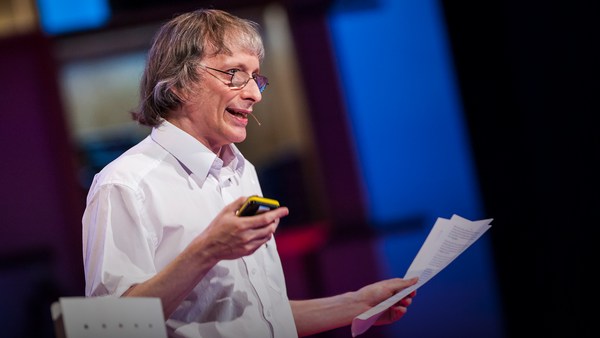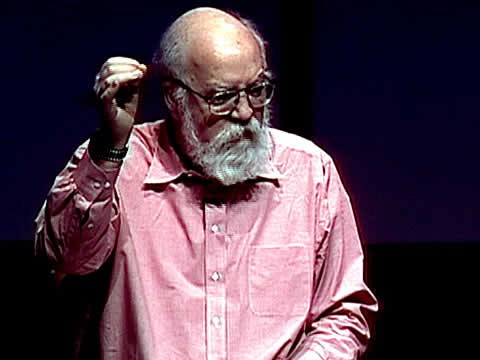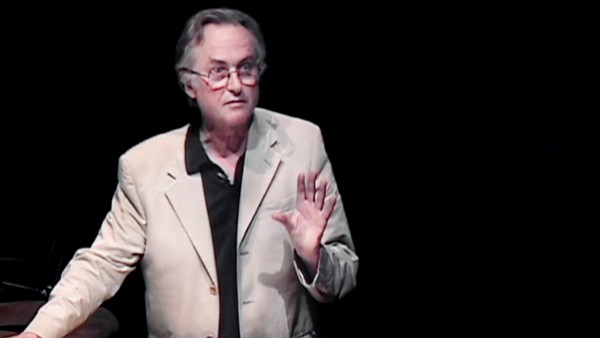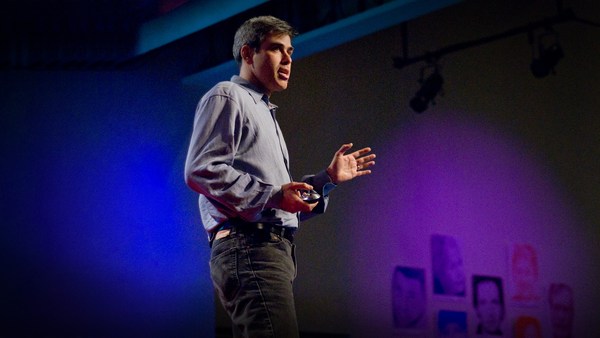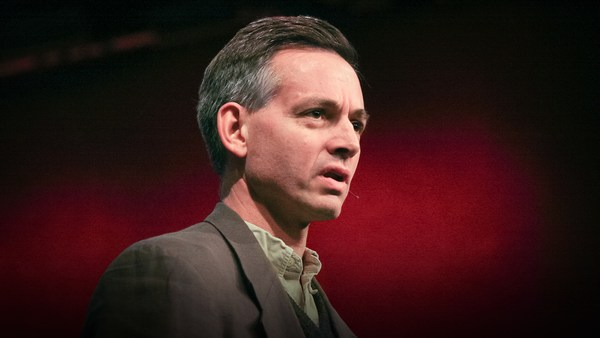I'm going to speak today about the relationship between science and human values. Now, it's generally understood that questions of morality -- questions of good and evil and right and wrong -- are questions about which science officially has no opinion. It's thought that science can help us get what we value, but it can never tell us what we ought to value. And, consequently, most people -- I think most people probably here -- think that science will never answer the most important questions in human life: questions like, "What is worth living for?" "What is worth dying for?" "What constitutes a good life?"
So, I'm going to argue that this is an illusion -- that the separation between science and human values is an illusion -- and actually quite a dangerous one at this point in human history. Now, it's often said that science cannot give us a foundation for morality and human values, because science deals with facts, and facts and values seem to belong to different spheres. It's often thought that there's no description of the way the world is that can tell us how the world ought to be. But I think this is quite clearly untrue. Values are a certain kind of fact. They are facts about the well-being of conscious creatures.
Why is it that we don't have ethical obligations toward rocks? Why don't we feel compassion for rocks? It's because we don't think rocks can suffer. And if we're more concerned about our fellow primates than we are about insects, as indeed we are, it's because we think they're exposed to a greater range of potential happiness and suffering. Now, the crucial thing to notice here is that this is a factual claim: This is something that we could be right or wrong about. And if we have misconstrued the relationship between biological complexity and the possibilities of experience well then we could be wrong about the inner lives of insects.
And there's no notion, no version of human morality and human values that I've ever come across that is not at some point reducible to a concern about conscious experience and its possible changes. Even if you get your values from religion, even if you think that good and evil ultimately relate to conditions after death -- either to an eternity of happiness with God or an eternity of suffering in hell -- you are still concerned about consciousness and its changes. And to say that such changes can persist after death is itself a factual claim, which, of course, may or may not be true.
Now, to speak about the conditions of well-being in this life, for human beings, we know that there is a continuum of such facts. We know that it's possible to live in a failed state, where everything that can go wrong does go wrong -- where mothers cannot feed their children, where strangers cannot find the basis for peaceful collaboration, where people are murdered indiscriminately. And we know that it's possible to move along this continuum towards something quite a bit more idyllic, to a place where a conference like this is even conceivable.
And we know -- we know -- that there are right and wrong answers to how to move in this space. Would adding cholera to the water be a good idea? Probably not. Would it be a good idea for everyone to believe in the evil eye, so that when bad things happened to them they immediately blame their neighbors? Probably not. There are truths to be known about how human communities flourish, whether or not we understand these truths. And morality relates to these truths.
So, in talking about values we are talking about facts. Now, of course our situation in the world can be understood at many levels -- from the level of the genome on up to the level of economic systems and political arrangements. But if we're going to talk about human well-being we are, of necessity, talking about the human brain. Because we know that our experience of the world and of ourselves within it is realized in the brain --
whatever happens after death. Even if the suicide bomber does get 72 virgins in the afterlife, in this life, his personality -- his rather unfortunate personality -- is the product of his brain. So the contributions of culture -- if culture changes us, as indeed it does, it changes us by changing our brains. And so therefore whatever cultural variation there is in how human beings flourish can, at least in principle, be understood in the context of a maturing science of the mind -- neuroscience, psychology, etc.
So, what I'm arguing is that value's reduced to facts -- to facts about the conscious experience of conscious beings. And we can therefore visualize a space of possible changes in the experience of these beings. And I think of this as kind of a moral landscape, with peaks and valleys that correspond to differences in the well-being of conscious creatures, both personal and collective. And one thing to notice is that perhaps there are states of human well-being that we rarely access, that few people access. And these await our discovery. Perhaps some of these states can be appropriately called mystical or spiritual. Perhaps there are other states that we can't access because of how our minds are structured but other minds possibly could access them.
Now, let me be clear about what I'm not saying. I'm not saying that science is guaranteed to map this space, or that we will have scientific answers to every conceivable moral question. I don't think, for instance, that you will one day consult a supercomputer to learn whether you should have a second child, or whether we should bomb Iran's nuclear facilities, or whether you can deduct the full cost of TED as a business expense. (Laughter) But if questions affect human well-being then they do have answers, whether or not we can find them. And just admitting this -- just admitting that there are right and wrong answers to the question of how humans flourish -- will change the way we talk about morality, and will change our expectations of human cooperation in the future.
For instance, there are 21 states in our country where corporal punishment in the classroom is legal, where it is legal for a teacher to beat a child with a wooden board, hard, and raising large bruises and blisters and even breaking the skin. And hundreds of thousands of children, incidentally, are subjected to this every year. The locations of these enlightened districts, I think, will fail to surprise you. We're not talking about Connecticut.
And the rationale for this behavior is explicitly religious. The creator of the universe himself has told us not to spare the rod, lest we spoil the child -- this is in Proverbs 13 and 20, and I believe, 23. But we can ask the obvious question: Is it a good idea, generally speaking, to subject children to pain and violence and public humiliation as a way of encouraging healthy emotional development and good behavior? (Laughter) Is there any doubt that this question has an answer, and that it matters?
Now, many of you might worry that the notion of well-being is truly undefined, and seemingly perpetually open to be re-construed. And so, how therefore can there be an objective notion of well-being? Well, consider by analogy, the concept of physical health. The concept of physical health is undefined. As we just heard from Michael Specter, it has changed over the years. When this statue was carved the average life expectancy was probably 30. It's now around 80 in the developed world. There may come a time when we meddle with our genomes in such a way that not being able to run a marathon at age 200 will be considered a profound disability. People will send you donations when you're in that condition. (Laughter)
Notice that the fact that the concept of health is open, genuinely open for revision, does not make it vacuous. The distinction between a healthy person and a dead one is about as clear and consequential as any we make in science. Another thing to notice is there may be many peaks on the moral landscape: There may be equivalent ways to thrive; there may be equivalent ways to organize a human society so as to maximize human flourishing.
Now, why wouldn't this undermine an objective morality? Well think of how we talk about food: I would never be tempted to argue to you that there must be one right food to eat. There is clearly a range of materials that constitute healthy food. But there's nevertheless a clear distinction between food and poison. The fact that there are many right answers to the question, "What is food?" does not tempt us to say that there are no truths to be known about human nutrition. Many people worry that a universal morality would require moral precepts that admit of no exceptions.
So, for instance, if it's really wrong to lie, it must always be wrong to lie, and if you can find an exception, well then there's no such thing as moral truth. Why would we think this? Consider, by analogy, the game of chess. Now, if you're going to play good chess, a principle like, "Don't lose your Queen," is very good to follow. But it clearly admits some exceptions. There are moments when losing your Queen is a brilliant thing to do. There are moments when it is the only good thing you can do. And yet, chess is a domain of perfect objectivity. The fact that there are exceptions here does not change that at all.
Now, this brings us to the sorts of moves that people are apt to make in the moral sphere. Consider the great problem of women's bodies: What to do about them? Well this is one thing you can do about them: You can cover them up. Now, it is the position, generally speaking, of our intellectual community that while we may not like this, we might think of this as "wrong" in Boston or Palo Alto, who are we to say that the proud denizens of an ancient culture are wrong to force their wives and daughters to live in cloth bags? And who are we to say, even, that they're wrong to beat them with lengths of steel cable, or throw battery acid in their faces if they decline the privilege of being smothered in this way?
Well, who are we not to say this? Who are we to pretend that we know so little about human well-being that we have to be non-judgmental about a practice like this? I'm not talking about voluntary wearing of a veil -- women should be able to wear whatever they want, as far as I'm concerned. But what does voluntary mean in a community where, when a girl gets raped, her father's first impulse, rather often, is to murder her out of shame?
Just let that fact detonate in your brain for a minute: Your daughter gets raped, and what you want to do is kill her. What are the chances that represents a peak of human flourishing?
Now, to say this is not to say that we have got the perfect solution in our own society. For instance, this is what it's like to go to a newsstand almost anywhere in the civilized world. Now, granted, for many men it may require a degree in philosophy to see something wrong with these images. (Laughter) But if we are in a reflective mood, we can ask, "Is this the perfect expression of psychological balance with respect to variables like youth and beauty and women's bodies?" I mean, is this the optimal environment in which to raise our children? Probably not. OK, so perhaps there's some place on the spectrum between these two extremes that represents a place of better balance. (Applause) Perhaps there are many such places --
again, given other changes in human culture there may be many peaks on the moral landscape. But the thing to notice is that there will be many more ways not to be on a peak. Now the irony, from my perspective, is that the only people who seem to generally agree with me and who think that there are right and wrong answers to moral questions are religious demagogues of one form or another.
And of course they think they have right answers to moral questions because they got these answers from a voice in a whirlwind, not because they made an intelligent analysis of the causes and condition of human and animal well-being. In fact, the endurance of religion as a lens through which most people view moral questions has separated most moral talk from real questions of human and animal suffering. This is why we spend our time talking about things like gay marriage and not about genocide or nuclear proliferation or poverty or any other hugely consequential issue. But the demagogues are right about one thing: We need a universal conception of human values.
Now, what stands in the way of this? Well, one thing to notice is that we do something different when talking about morality -- especially secular, academic, scientist types. When talking about morality we value differences of opinion in a way that we don't in any other area of our lives. So, for instance the Dalai Lama gets up every morning meditating on compassion, and he thinks that helping other human beings is an integral component of human happiness. On the other hand, we have someone like Ted Bundy; Ted Bundy was very fond of abducting and raping and torturing and killing young women.
So, we appear to have a genuine difference of opinion about how to profitably use one's time. (Laughter) Most Western intellectuals look at this situation and say, "Well, there's nothing for the Dalai Lama to be really right about -- really right about -- or for Ted Bundy to be really wrong about that admits of a real argument that potentially falls within the purview of science. He likes chocolate, he likes vanilla. There's nothing that one should be able to say to the other that should persuade the other." Notice that we don't do this in science.
On the left you have Edward Witten. He's a string theorist. If you ask the smartest physicists around who is the smartest physicist around, in my experience half of them will say Ed Witten. The other half will tell you they don't like the question. (Laughter) So, what would happen if I showed up at a physics conference and said,"String theory is bogus. It doesn't resonate with me. It's not how I chose to view the universe at a small scale. I'm not a fan." (Laughter) Well, nothing would happen because I'm not a physicist; I don't understand string theory. I'm the Ted Bundy of string theory. (Laughter) I wouldn't want to belong to any string theory club that would have me as a member.
But this is just the point. Whenever we are talking about facts certain opinions must be excluded. That is what it is to have a domain of expertise. That is what it is for knowledge to count. How have we convinced ourselves that in the moral sphere there is no such thing as moral expertise, or moral talent, or moral genius even? How have we convinced ourselves that every opinion has to count? How have we convinced ourselves that every culture has a point of view on these subjects worth considering? Does the Taliban have a point of view on physics that is worth considering? No. (Laughter) How is their ignorance any less obvious on the subject of human well-being? (Applause)
So, this, I think, is what the world needs now. It needs people like ourselves to admit that there are right and wrong answers to questions of human flourishing, and morality relates to that domain of facts. It is possible for individuals, and even for whole cultures, to care about the wrong things, which is to say that it's possible for them to have beliefs and desires that reliably lead to needless human suffering. Just admitting this will transform our discourse about morality. We live in a world in which the boundaries between nations mean less and less, and they will one day mean nothing.
We live in a world filled with destructive technology, and this technology cannot be uninvented; it will always be easier to break things than to fix them. It seems to me, therefore, patently obvious that we can no more respect and tolerate vast differences in notions of human well-being than we can respect or tolerate vast differences in the notions about how disease spreads, or in the safety standards of buildings and airplanes. We simply must converge on the answers we give to the most important questions in human life. And to do that, we have to admit that these questions have answers. Thank you very much. (Applause)
Chris Anderson: So, some combustible material there. Whether in this audience or people elsewhere in the world, hearing some of this, may well be doing the screaming-with-rage thing, after as well, some of them.
Language seems to be really important here. When you're talking about the veil, you're talking about women dressed in cloth bags. I've lived in the Muslim world, spoken with a lot of Muslim women. And some of them would say something else. They would say, "No, you know, this is a celebration of female specialness, it helps build that and it's a result of the fact that" -- and this is arguably a sophisticated psychological view -- "that male lust is not to be trusted." I mean, can you engage in a conversation with that kind of woman without seeming kind of cultural imperialist?
Sam Harris: Yeah, well I think I tried to broach this in a sentence, watching the clock ticking, but the question is: What is voluntary in a context where men have certain expectations, and you're guaranteed to be treated in a certain way if you don't veil yourself? And so, if anyone in this room wanted to wear a veil, or a very funny hat, or tattoo their face -- I think we should be free to voluntarily do whatever we want, but we have to be honest about the constraints that these women are placed under. And so I think we shouldn't be so eager to always take their word for it, especially when it's 120 degrees out and you're wearing a full burqa.
CA: A lot of people want to believe in this concept of moral progress. But can you reconcile that? I think I understood you to say that you could reconcile that with a world that doesn't become one dimensional, where we all have to think the same. Paint your picture of what rolling the clock 50 years forward, 100 years forward, how you would like to think of the world, balancing moral progress with richness.
SH: Well, I think once you admit that we are on the path toward understanding our minds at the level of the brain in some important detail, then you have to admit that we are going to understand all of the positive and negative qualities of ourselves in much greater detail. So, we're going to understand positive social emotion like empathy and compassion, and we're going to understand the factors that encourage it -- whether they're genetic, whether they're how people talk to one another, whether they're economic systems, and insofar as we begin to shine light on that we are inevitably going to converge on that fact space.
So, everything is not going to be up for grabs. It's not going to be like veiling my daughter from birth is just as good as teaching her to be confident and well-educated in the context of men who do desire women. I mean I don't think we need an NSF grant to know that compulsory veiling is a bad idea -- but at a certain point we're going to be able to scan the brains of everyone involved and actually interrogate them. Do people love their daughters just as much in these systems? And I think there are clearly right answers to that.
CA: And if the results come out that actually they do, are you prepared to shift your instinctive current judgment on some of these issues?
SH: Well yeah, modulo one obvious fact, that you can love someone in the context of a truly delusional belief system. So, you can say like, "Because I knew my gay son was going to go to hell if he found a boyfriend, I chopped his head off. And that was the most compassionate thing I could do." If you get all those parts aligned, yes I think you could probably be feeling the emotion of love. But again, then we have to talk about well-being in a larger context. It's all of us in this together, not one man feeling ecstasy and then blowing himself up on a bus.
CA: Sam, this is a conversation I would actually love to continue for hours. We don't have that, but maybe another time. Thank you for coming to TED.
SH: Really an honor. Thank you. (Applause)
